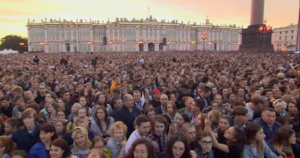
Russia seeks to avoid lockdown as coronavirus cases climb
Top Russian officials seemed determined not to resort to a lockdown this week amid a nationwide rise in coronavirus case numbers and few signs that vaccination uptake was growing. Even as local authorities introduced new restrictions, experts warned only a full lockdown could guarantee a significant reduction in infections and deaths. For a host of political and economic reasons, the Kremlin will do everything it can to avoid this option.
Infections
Moscow did not see an explosive increase in infections this week: after setting an all-time record of 9,120 new infections in one day on June 19, the daily figures have stayed below 9,000. However, in Russia as a whole, over 20,000 new infections were recorded Thursday for the first time since January. Almost 600 people died from Covid-19 that day.
A total of 130,000 people were in hospital in Russia with COVID-19 on Wednesday, according to Health Minister Mikhail Murashko.
The rapid rise in rates caused France to add Russia on Wednesday to its coronavirus ‘hotspot list, and Germany followed suit two days later. Now, the few Russians able to travel to these countries face two weeks of quarantine on arrival.
Vaccinations
The government claims vaccination uptake has risen since the Delta variant arrived in Russia and Deputy Prime Minister Tatiana Golikova announced Wednesday that vaccination rates were up 1.7 times over the previous weeks — but there are no publicly available figures. According to open source website Our World in Data, the number of jabs in Russia last week was up 25 percent.
At the same time, vaccinations have leapt to the forefront in public discourse. The number of social media posts about vaccines increased fivefold last week and vaccines were three times more popular a topic on social media than the Putin-Biden summit on 16 June (which took place the same day that Moscow announced its mandatory vaccination program).
Restrictions and concession
Amid the rise in cases, the authorities are using the same tactics as they did at the height of the first wave of the pandemic. Now, as then, President Vladimir Putin and Prime Minister Mishustin have all but disappeared from public decision-making, limiting themselves to just one video conference with government officials in recent weeks. Instead, regional leaders have been left to take the political hit of imposing unpopular new restrictions. Moscow Mayor Sergei Sobyanin continues to act (relatively) toughly, if not always consistently.
The most unpopular of Sobyanin’s measures was announced Tuesday: restaurants will be closed to people from Monday without a vaccine, evidence that they have been ill with COVID-19 or a PCR test from the previous 72 hours. Compared with last year’s lockdown, it’s a fairly mild restriction. But the public response and the complaints from businesses were so furious that, after an appeal from restaurant owners, the authorities backed down: until July 12, people can still dine freely outside.
Another unpopular measure in the south of the country also caused widespread outrage. The governor of Krasnodar Region banned unvaccinated travellers from staying at Black Sea resorts, including in the city of Sochi. This means people with bookings face losing 80 percent of their money. Governor Venyamin Kondratyev announced the decision Thursday and by the following day 30 percent of resort bookings for July and 70 percent for August had already been cancelled. Both the Russian Association of Tour Operators and the government tourism agency urged Kondratyev to reconsider the ban.
Regional governments are unlikely to introduce many more such unpopular measures. In Moscow, movie theaters, gyms and shopping malls are operating as normal. Elsewhere, even big public events went ahead as normal. In St. Petersburg, which has Russia’s worst COVID-19 death rate, the traditional ‘Crimson Sails’ high school graduation ceremony went ahead as usual Friday and tens of thousands of people crowded the streets.

A source familiar with official discussions about new restrictions explained why the authorities were so uncoordinated. “It’s a managerial shambles caused by the government’s reluctance to take responsibility,” he said. However, polling experts interviewed by The Bell do not expect this ‘shambles’ to harm the government’s overall popularity.
Will Russia contain the third wave?
Every expert who spoke to The Bell agreed the only reliable way to slow the spread of the Delta variant was another full lockdown. And it’s difficult to say whether the measures announced last week will be effective: “We do not fully understand how much these half-hearted restrictions will be able to stop the spread of COVID-19 given that people are being infected by a new strain,” said Anton Barchuk, director of the Institute for Interdisciplinary Medical Research at the European University in St. Petersburg.
But the political and economic risks mean the authorities will only impose another lockdown if the situation gets significantly worse. “I think that the authorities delayed this decision [about compulsory vaccines] to the very last moment,” said expert Denis Volkov at independent polling agency Levada Center. “In the original plan [compulsory vaccines] should have only been announced after the elections. But now they have to choose between a not very popular vaccine and an unambiguously unpopular lockdown.”
At the current rate of vaccination Russia will only achieve herd immunity on the back of people recovering from infection, according to Barchuk. And while, previously, between 60 percent and 70 percent immunity would provide broad protection to society as a whole, the new variant pushes that as high as 90 percent. “If widespread public immunity [only] results from people recovering from the disease and the mortality rate is between 0.8 and 1 percent, you can calculate how many deaths we might expect,” Barchuk said.
Why the world should care: Russia has fallen into a familiar trap for populist authoritarian regimes. On the rare occasions when an over-centralized government could use its powers for the general good, it turns out to be too scared of public opinion to introduce unpopular measures.




